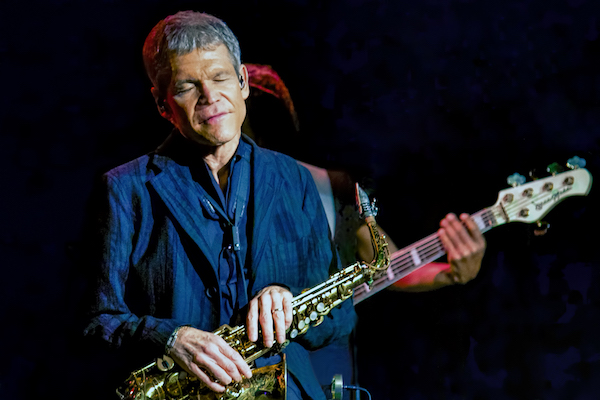Jan 13, 2026 2:09 PM
More Trump-Kennedy Center Cancellations
The fallout from the renaming of the John F. Kennedy Center for the Performing Arts to include President Donald…

David Sanborn’s roots are laid deep in the blues—he played with Albert King when he was 14—and he also came up around avant-gardists in his hometown of St Louis.
(Photo: Michael Jackson)Experimentalist Anthony Braxton was a devotee of Desmond, too.
I was there when Braxton met Lee Konitz and Anthony sang Lee’s solo on “Subconscious Lee” back to him note for note. Lee was floored. People make suppositions, but musicians can sometimes surprise you as to the music they listen to.
I’m not so interested in what is or isn’t jazz. The guardians of the gate can be quite combative, but what are they protecting? Jazz has always absorbed and transformed what’s around it. It’s not like “When the cha-cha went away, music died.” Writers have a vested interest in creating conflict too, sometimes it seems as though they don’t want to like something that everybody loves, but I never cross anybody off. I mean, some young player on the internet claimed Wayne Shorter couldn’t play! They used to say that about Miles. It’s not a contest. Is Clifford Brown a better player than Miles Davis? Wayne and Miles came out of bebop but they also transcended it. Real musicians don’t have any time to spend thinking about limited categories.
Stylistically, you like to try things, on Closer (Verve 2005) you delve into a South African township vibe on “Capetown Fringe.” How did that come about?
I have a friend named Morris Goldberg, who plays the penny whistle on Paul Simon’s “You Can Call Me Al.” He was from South Africa. Morris and I talked about the essence of that subtle South African time feel, which is a little like calypso, but I never really felt I got inside it, it’s deceptively simple. I guess I’d give myself an E for Effort.
You don’t seem to have lost an iota of enthusiasm for music. It all seems to telescope back to those days playing the blues in St Louis.
We used to go hear these musicians like Little Milton and Albert King at what were known as teen towns—recreation centers, where there’d be a swimming pool, a bandstand, a dance. There’d be no alcohol but regular touring bands like the Chi-lites, Ike and Tina, Chuck Berry as well as Milton and Albert. I was about 14 and I befriended this older guy, Rick Bolden (probably himself only 16 or 17), who played piano with Albert and saw me and a pal standing by the stage hoping to sit in, these young white guys, fans of the music. Little Milton graciously allowed me to sit in and boom, I was in show business! Then I thought to myself, I get to feel like this at my job? Then I’m in! DB

Belá Fleck during an interview with Fredrika Whitfield on CNN.
Jan 13, 2026 2:09 PM
The fallout from the renaming of the John F. Kennedy Center for the Performing Arts to include President Donald…

Peplowski first came to prominence in legacy swing bands, including the final iteration of the Benny Goodman Orchestra, before beginning a solo career in the late 1980s.
Feb 3, 2026 12:10 AM
Ken Peplowski, a clarinetist and tenor saxophonist who straddled the worlds of traditional and modern jazz, died Feb. 2…

The success of Oregon’s first album, 1971’s Music Of Another Present Era, allowed Towner to establish a solo career.
Jan 19, 2026 5:02 PM
Ralph Towner, a guitarist and composer who blended multiple genres, including jazz — and throughout them all remained…

Rico’s Anti-Microbial Instrument Swab
Jan 19, 2026 2:48 PM
With this year’s NAMM Show right around the corner, we can look forward to plenty of new and innovative instruments…

Richie Beirach was particularly renowned for his approach to chromatic harmony, which he used to improvise reharmonizations of originals and standards.
Jan 27, 2026 11:19 AM
Richie Beirach, a pianist and composer who channeled a knowledge of modern classical music into his jazz practice,…